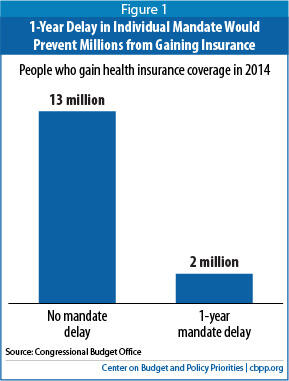House Energy and Commerce Committee Chairman Fred Upton recently indicated that the House may vote again on a one-year delay of health reform’s individual mandate — which will require most Americans to obtain health coverage or pay a penalty starting in 2014 — citing the current difficulties in enrolling through the federal exchange website.[1] The Administration has already issued guidance clarifying that any individual now without health insurance who enrolls in exchange coverage by the end of the open enrollment period on March 31, 2014 would not have to pay a penalty.[2] Most importantly, a one-year delay in the individual mandate would adversely affect millions of Americans. The Congressional Budget Office (CBO) has estimated that such a delay would cause 11 million more Americans to remain uninsured in 2014 and result in higher premiums for many others. It also would disrupt the new health insurance exchanges in the middle of the open enrollment season .
Specifically, a one-year delay of the individual mandate would reduce the expected coverage gains under the Affordable Care Act (ACA) by nearly 85 percent, relative to current law, according to a recent CBO estimate. Delaying the individual mandate also would raise premiums for health insurance purchased in the individual market in 2014, CBO finds.
Earlier CBO estimates indicated that permanently repealing the mandate would raise average health insurance premiums in the individual market — inside and outside the new health insurance exchanges — by 15 percent to 20 percent, amounting to hundreds or thousands of dollars a year in higher premium charges for large numbers of individuals and families. Without the individual mandate, the exchanges may well not be viable over the long run; the higher premiums would discourage many healthier people from enrolling, sending premiums up still more.
Indeed, that’s likely a core goal of those who seek a one-year delay. A year from now, they would demand another one-year delay and then another or outright repeal (especially if ACA opponents pick up more seats in coming elections). Thus, we should see the one-year delay for what it is — a central element of an effort to dismember health reform over the next few years.
Finally, a delay in the mandate would severely disrupt the open-enrollment season (which started on October 1), and likely push back the date at which coverage through the exchanges will first be in effect, scheduled for January 1, 2014. Insurers have submitted premium rates for plans they will offer in 2014 based on the assumption that the mandate will be in effect, as the law requires. If Congress cancels the individual mandate for 2014, insurers will very likely withdraw their bids, demand time to calculate higher premiums, and submit new, and likely substantially increased, premium rates.
Without a Mandate, Millions More Americans Will Be Uninsured
The individual mandate will spur more people without coverage to enroll in the health insurance options available to them in 2014 — through their jobs, public programs like Medicaid and the Children’s Health Insurance Program (CHIP), or subsidized coverage through the new health insurance exchanges. Without the mandate, many fewer people would enroll in health coverage.
A one-year delay in the individual mandate, which the House also passed in July, would result in about 11 million more uninsured people in 2014, CBO estimates.[3] (In addition, 2 million more people would be uninsured in 2015, and 1 million more would be uninsured in 2016, relative to current law). Because CBO estimates that, under current law, the ACA will result in 13 million people who would otherwise be uninsured gaining health coverage in 2014, a one-year delay in the mandate would slash expected coverage gains next year by nearly 85 percent.
Outside analysts examining the effects of repealing the mandate entirely have produced similar estimates:
- The Urban Institute estimates that relative to current law, the lack of a mandate would result in 13.4 million to 15.8 million more people without health insurance coverage.[4]
- Massachusetts Institute of Technology (MIT) health economist Jonathan Gruber estimates that the number of uninsured would be 24 million higher without a mandate.[5]
- RAND Corporation analysts expect the number of uninsured to rise by 12.5 million without a mandate.[6]
- The Lewin Group projects that without a mandate, there would be 7.8 million more uninsured individuals.[7]
Starting in 2014, the ACA prohibits many of the most troublesome practices of health insurers in today’s flawed individual market — such as denying coverage to people with pre-existing conditions like cancer or diabetes, or charging sick people higher premiums.
Without an individual mandate to encourage people to enroll in coverage, these market reforms would make health care coverage less affordable by enabling older and sicker people (who largely have been shut out of the individual insurance market) to buy coverage in the individual market while allowing healthier uninsured people to wait until they get sick to buy it. The pool of people with coverage in the individual market would get older and sicker, so premiums would rise substantially. These large premium hikes would lead some healthier people to go without insurance, which would raise premiums still higher and further discourage healthier people from keeping their coverage.
CBO thus expects a one-year delay in the individual mandate to “result in higher health insurance premiums in the non-group market (that is, premiums for individually purchased health insurance) in 2014.”[8] While CBO does not specify the magnitude of the premium increases that would result from a one-year delay, earlier CBO estimates examining the impact of permanently repealing the individual mandate found that average premiums in the individual market inside and outside the exchanges would rise by 15 percent to 20 percent, relative to current law.[9] Outside analysts estimating the effects of permanently repealing the individual mandate concur with CBO:
- The Urban Institute estimates that without any individual mandate, average individual-market premiums under the ACA would increase by roughly 10 percent to 25 percent.[10]
- MIT’s Gruber estimates that average individual market premiums would be 27 percent higher than under current law.[11]
- RAND expects that average premiums in the individual market would rise by 9.3 percent without the mandate.[12]
- The Lewin Group estimates that average premiums in the individual market would increase by 12.6 percent without the mandate.[13]
Mandate Delay Could Disrupt the New Health Insurance Exchanges
Because insurers have already submitted their premium rates for the plans they will offer in 2014, on the assumption that the individual mandate will be in effect, a one-year delay would risk severely disrupting the start of the new exchanges. If the individual mandate were delayed this fall, insurers would immediately ask for significant time to recalculate the higher premiums they would need to charge to take the mandate delay into account. That would likely suspend the open-enrollment period that started on October 1 and potentially push back the January 1, 2014 start for when exchange coverage will be effective. Individuals and families seeking to purchase coverage through the exchanges would have to wait longer to enroll in exchange plans and obtain coverage. The delay in the individual mandate would also similarly affect plans offered in the individual market outside of the exchange.
Delaying the individual mandate for one year would undermine health reform just as the major coverage expansions are set to take effect in 2014. Millions more people would remain uninsured. It would also drive up premiums sharply in the reformed individual market inside and outside the new exchanges, as well as disrupt exchange operations in the middle of the open enrollment season. Policymakers should firmly reject any a delay .

